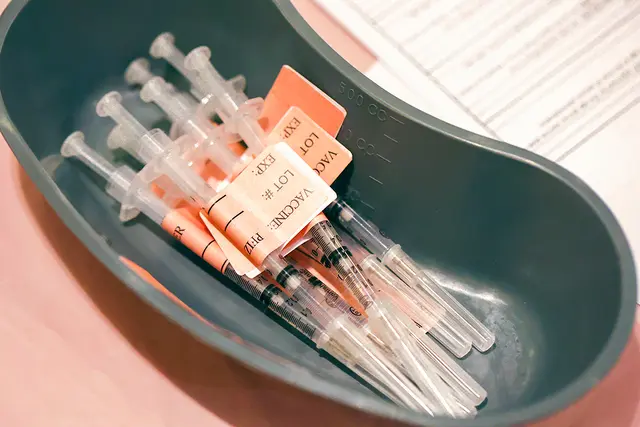COVID-19 Shot May Be Linked to Unexpected Vaginal Bleeding: Study

Atypical vaginal bleeding after injection with the Moderna and Pfizer vaccines has been discovered in COVID-19-vaccinated women who do not menstruate, according to Norwegian researchers.
Over a nine-month period, researchers studied nearly 22,000 women at various reproductive aging stages and discovered that 3.3 percent of postmenopausal, 14.1 percent of perimenopausal, and 13.1 percent of premenopausal women experienced at least one unexpected bleed after receiving the COVID-19 shot, according to the authors of the study published in Science Advances.
Approximately half of the bleeds were reported within the first four weeks of receiving the vaccine. The risk of bleeding in postmenopausal women was two to three times higher after the injection than before it. Both perimenopausal and premenopausal women had a three- to fivefold increased risk. Perimenopausal women are typically in their forties and have begun to experience menopause symptoms, but they can still become pregnant, whereas premenstrual women have no menopause symptoms.
Researchers also discovered a difference in women’s susceptibility when one shot was given over the other. Premenopausal women had a 32% higher risk of vaginal bleeding after receiving the Moderna vaccine than the Pfizer vaccine.
How Is Vaccination Linked to Bleeding?
Kristine Blix, the study’s lead author, and her colleagues at the Norwegian Institute of Public Health in Oslo examined COVID-19 vaccines and unexpected bleeding in three groups using questionnaire data from an ongoing population health survey.
“We had already, from the early pandemic, biweekly questionnaires going out to cohort participants to monitor effects of the pandemic,” Ms. Blix told the newspaper.
According to responses to the 2021 questionnaire, some women experienced unusually heavy menstrual bleeding after receiving the vaccine. “This urged us to ask for bleeding patterns in a structured manner,” she went on to say.
Ms. Blix’s team did not look into the causes of the unexplained bleeding, and there is no conclusive evidence that the shot caused it. One theory is that the SARS-CoV-2 spike protein used in the vaccines is to blame.
“Increased risk after both Comirnaty (Pfizer) and Spikevax (Moderna) suggest a mechanism related to the severe acute respiratory syndrome coronavirus (SARS-CoV-2) spike protein and not to other vaccine components,” according to the authors of the paper. “This is also supported by a higher risk observed after Spikevax in premenopausal women.” According to the researchers, possible pathways to cause the bleeding include a spike protein-related immune response or endometrial expression of the angiotensin-converting enzyme 2 (ACE2) receptors, which serve as the virus’ entry point.
Additional Studies
A February study of nearly 8,000 women discovered that abnormal bleeding was a common side effect of the Pfizer vaccine. The majority of women experienced excessive bleeding between their vaccination date and their next menstrual period, according to the authors of the study, who recommend further research into the events and the potential long-term consequences of vaccine-induced vaginal bleeding.
The Lancet published a study in 2022 that found that nearly 64,000 women aged 18 and older had menstrual irregularities or vaginal bleeding ranging from altered menstruation timing and severity of menstrual symptoms to menopausal bleeding and resumption of menses.
In contrast, a 2023 study published in Vaccine found that premenopausal women vaccinated for COVID-19 were no more likely than unvaccinated women to report irregular menstrual cycles or heavier bleeds after the shot. The authors did admit to a one-day delay or a one-day longer cycle in vaccinated versus unvaccinated women.
Possible Causes of Irregular Vaginal Bleeding
Irregular bleeding can be caused by a variety of factors, including stress and more serious underlying medical conditions such as:
- endometriosis.
- Inflammation of the cervix.
- Polycystic ovary syndrome (PCOS).
- Ovarian insufficiency is a primary condition.
- Thyroid or pituitary gland dysfunction.
- Cancer of the uterus or the ovaries.
In addition to medications, pregnancy complications can cause irregular bleeding. Birth control pills are one example.
- Steroids and blood thinners are examples of medications.
- Miscarriages or ectopic pregnancies are both possibilities.
- Surgeries, scarring, or blockages in the uterus, ovaries, or fallopian tubes of a woman.
FDA Still Recommends the Vaccine
On September 11, the U.S. Food and Drug Administration (FDA) approved an updated COVID-19 vaccine for emergency use, stating that it was “formulated to more closely target currently circulating variants and to provide better protection against serious COVID-19 consequences, including hospitalization and death.”
“Vaccination remains critical to public health and continued protection against serious consequences of COVID-19, including hospitalization and death,” Dr. Peter Marks, director of the FDA’s Center for Biologics Evaluation and Research, said in a press release. “The public can be confident that these updated vaccines have met the agency’s stringent scientific standards for safety, efficacy, and manufacturing quality.” We strongly encourage those who are eligible to get vaccinated.”





